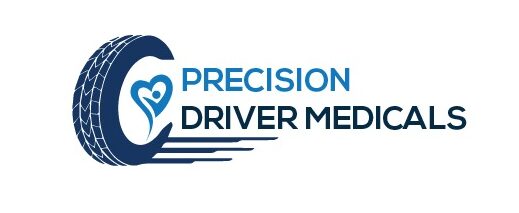Learn about DVLA medical standards for drivers in the UK. Discover the key medical requirements for HGV, PCV, and taxi drivers, and how Precision Driver Medicals ensures full DVLA compliance across the UK.
Introduction
Driving in the UK is not just about passing your theory and practical test—it’s also about staying fit to drive. The DVLA medical standards for drivers exist to ensure that everyone behind the wheel, whether driving an HGV, bus, or taxi, meets the physical and mental health requirements to drive safely on UK roads.
At Precision Driver Medicals, we help drivers across the UK meet these DVLA standards efficiently and affordably. Our GMC-registered doctors provide quick, compliant, and stress-free medical assessments to keep you on the road with confidence.
What Are DVLA Medical Standards for Drivers?
The DVLA (Driver and Vehicle Licensing Agency) sets medical standards that all UK drivers must meet. These standards help determine whether a driver’s health conditions could affect their ability to operate a vehicle safely.
There are two main categories of drivers under DVLA standards:
- Group 1 drivers – Cars and motorcycles
- Group 2 drivers—large goods vehicles (HGV) and passenger-carrying vehicles (PCV)
Group 2 drivers must meet higher medical standards due to the nature and responsibility of driving larger, heavier vehicles that carry goods or passengers.

Why Are DVLA Medical Standards Important?
The DVLA medical standards for drivers exist to protect both drivers and the public. Health conditions like poor eyesight, heart disease, diabetes, or neurological disorders can significantly impact reaction times and driving safety.
By ensuring drivers undergo regular medicals, the DVLA helps:
- Maintain public safety on UK roads
- Reduce the risk of accidents caused by medical conditions
- Ensure professional drivers remain fit to drive
- Promote early detection of health issues
At Precision Driver Medicals, we support this mission by offering convenient, DVLA-compliant driver medicals at multiple locations across the UK.
Medical Requirements for HGV and PCV Drivers
If you drive large vehicles such as lorries, buses, or coaches, you fall under Group 2 DVLA medical standards. These are stricter than standard car driver requirements.
During an HGV or PCV driver medical, you will need to complete a D4 Medical Form, which includes:
- Vision test: Ensuring your eyesight meets the minimum DVLA standard.
- Blood pressure check: High blood pressure can affect safe driving and must be within DVLA limits.
- Medical history review: Covers conditions like epilepsy, diabetes, sleep disorders, or heart problems.
- General health assessment: Checking reflexes, coordination, and mental fitness.
How Often Are HGV and PCV Medicals Required?
- On first applying for your Group 2 license
- At age 45, then every 5 years until 65
- Annually from age 65 onwards
Our doctors at Precision Driver Medicals complete the full D4 medical form, ensuring your results are accurate, valid, and accepted by the DVLA.
Taxi and Private Hire Drivers: Meeting Local Authority Standards
While the DVLA medical standards for drivers apply nationally, taxi and private hire drivers often need additional medicals approved by their local licensing authorities.
Each local council may set specific requirements, but most align with Group 2 DVLA medical standards.
Our team specializes in taxi medicals, also known as D4 or PCO medicals, providing:
- Full medical examinations by GMC-registered doctors
- Eye and blood pressure tests
- Completion of your council’s required medical forms
We work closely with licensing authorities to ensure your medical report meets every requirement for taxi and private hire applications.
Common Health Conditions That Affect Driving Eligibility
When it comes to DVLA medical standards for drivers, certain health conditions may restrict or limit driving eligibility. Below are some of the most important to be aware of:
1. Eyesight Problems
You must be able to read a number plate from 20 meters away and have at least 6/7.5 vision in one eye and 6/60 in the other (corrected if necessary).
2. Diabetes
Drivers with insulin-treated diabetes can still drive but must demonstrate control and regular monitoring of blood glucose levels.
3. Neurological Disorders
Conditions such as epilepsy, narcolepsy, or blackouts must be declared to the DVLA. Regular medical reviews are often required.
4. Heart Conditions
If you’ve had a heart attack, angina, or heart surgery, you may need medical clearance before resuming driving duties.
5. Sleep Disorders
Sleep apnea can impair alertness and reaction times. If diagnosed, treatment compliance is mandatory for continued driving eligibility.
At Precision Driver Medicals, our doctors assess all relevant health aspects to ensure full compliance with DVLA regulations and guide you through any required follow-ups.

How Precision Driver Medicals Helps You Stay DVLA-Compliant
We understand that time off the road can cost drivers money and opportunities. That’s why we make the process simple, fast, and affordable.
Our Process
- Book online—Quick, easy booking through our secure website.
- Attend your appointment—medicals take about 15 minutes.
- DVLA form completion—Our GMC doctors fill in your D4 or relevant form correctly.
- Same-day results—Walk away with your completed paperwork, ready for submission.
Whether you’re an HGV, PCV, or taxi driver, our goal is to make your DVLA medical standards compliance as smooth and stress-free as possible.
Why Choose Precision Driver Medicals?
We’re trusted by thousands of UK drivers for reliable, professional medical services.
Here’s why drivers choose us:
- GMC-registered, DVLA-compliant doctors
- Affordable prices with no hidden fees
- Same-day and evening appointments available
- Nationwide coverage across multiple UK locations
- Quick 15-minute appointments, including vision and BP tests
Your safety and professional license are our top priorities.
Staying Up-to-Date with DVLA Medical Standards
The DVLA periodically updates its medical standards to reflect new health and safety data. Drivers are legally required to inform the DVLA of any new or worsening health conditions that might impact driving ability.
Failure to do so could result in:
- License suspension or revocation
- Insurance invalidation
- Legal consequences if involved in an accident
At Precision Driver Medicals, we keep up with every DVLA update, so you don’t have to. We’ll ensure your medical assessment always meets the latest national standards.
Book Your DVLA Driver Medical Today
If you’re due for your HGV, PCV, or taxi medical, or just want to ensure you meet DVLA medical standards for drivers, book your appointment with Precision Driver Medicals today.
We provide professional driver medicals nationwide—helping you stay road-legal, compliant, and confident.
Top Services
- Driver Medical
- HGV/Lorry Drivers (HGV medical)
- Taxi Drivers (Hackney Carriage & Private Hire Medical)
- Private Hire
- PCV/Bus Drivers (PCV medical)
- PCO Medical
- Bus Medical Service
- Motorhome Medical
- Ambulance Medical
- Forklift Driver Medical
- TFL Medical
Top Links
10 Important Links for Driver Medicals UK
- DVLA – D4 Medical Examination Report
→ Official D4 form for HGV/PCV drivers. - DVLA – Driving Licences for Lorry, Bus and Coach Drivers
→ Requirements for becoming a lorry or bus driver. - TfL – Private Hire and Taxi Driver Medical Requirements
→ TfL’s official medical guidelines for PCO/private hire drivers. - DVLA – Eyesight Rules for Drivers
→ Legal eyesight standards for all UK drivers. - DVLA – Medical Conditions and Driving
→ Guidance on how medical conditions affect driving eligibility. - NHS – Medical Exams for Professional Drivers
→ NHS overview of driver medical exams. - Driver & Vehicle Standards Agency (DVSA)
→ Regulator for driving and vehicle safety standards in the UK. - General Medical Council (GMC)
→ Authority for registered medical professionals in the UK. - Gov.uk – Renew Driving Licence
→ Process for renewing a UK driving licence. - National Register of LGV Instructors (NRI)
→ Training and standards for LGV/HGV instructors.


